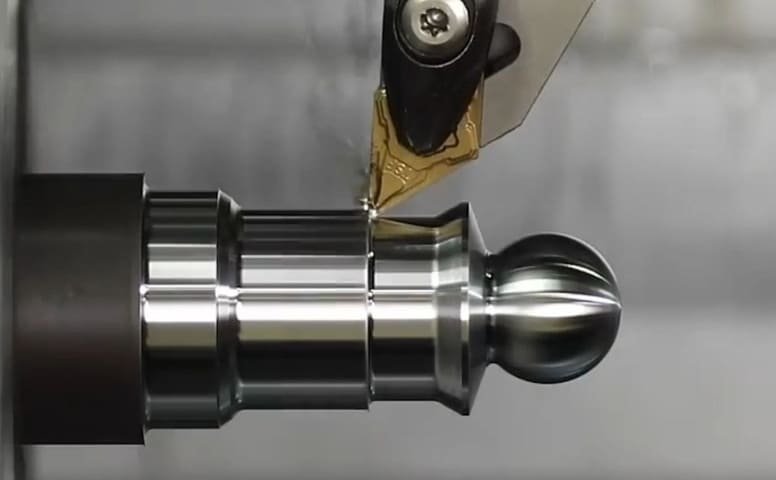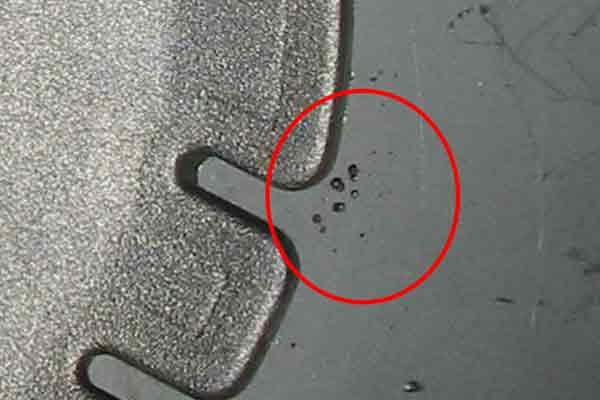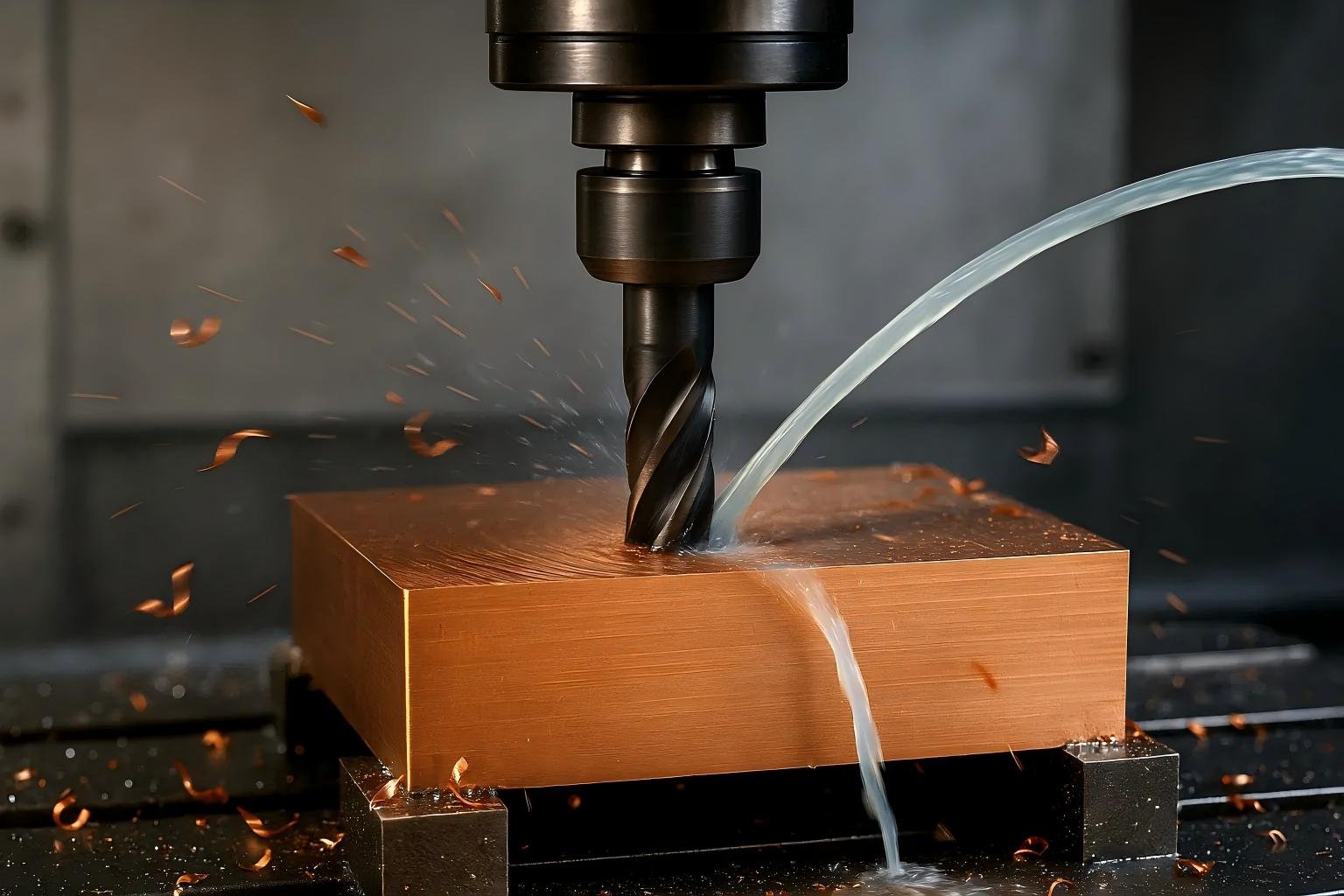Introduction
Plastics are essential to the current manufacturing sector because they are generally accessible, most of them are inexpensive, and they work with well-liked production techniques like injection molding, 3D printing, and CNC precision milling.
CNC machining is a subtractive manufacturing technique that involves carefully removing material from a solid block of material with spinning tools and drills to shape the component.
In terms of producing plastic components, CNC machining is more accurate than injection molding.
Additionally, compared to many other manufacturing techniques, CNC machining is more compatible with a wider variety of plastics, which makes it an attractive option for many product teams to produce parts through machining.

Plastic machining
What is Derlin
An acetal polymer known by the trade name Delrin is widely utilized in CNC machining because of its remarkable characteristics. The substance, which is also referred to as POM (Polyoxymethylene) or Delrin plastic, may be further machined using procedures like injection molding and 3D printing. There are many grades of Delrin that each have a unique combination of characteristics.
Due to its high tensile strength, low friction and high wear resistance, creep and warp resistance, and general toughness and longevity, Delrin plastic serves as a great alternative to metal. Superior density, reduced moisture absorption, and chemical resistance to hydrocarbons, solvents, and neutral chemicals are only a few of the qualities of the Delrin substance.
What is PEEK
The PAEK family of materials includes the high-performance engineering thermoplastic known as PEEK, or polyether ether ketone. The semi-crystalline material, which has outstanding strength, wear resistance, and abrasion resistance, and maintains its qualities even at high temperatures, is utilized for a variety of industrial parts and components.
PEEK grades are comparable to PPS in terms of chemical and water resistance. PEEK, on the other hand, has a melting point of 343°C and can withstand temperatures up to 250°C without permanently losing its physical qualities. It can also be utilized in hot water or steam. PEEK is a high-performance plastic that may be found in granule, filament, and bar or rod forms for CNC machining. Typically, it is either medical-grade or industrial-grade.
What is Teflon/PTFE
Tetrafluoroethylene (TFE) is a fluoropolymer and thermoplastic. Teflon is a trademark of the American chemical corporation Chemours, a division of the industry titan DuPont (now DowDuPont).
It is resistant to almost all industrial chemicals and solvents, withstands extremely high temperatures, and is a superb insulator. It is frequently used for items that need an anti-stick surface because of its low coefficient of friction, making it an excellent choice for situations where components would move against one another.
Teflon, which is a polymer of tetrafluoroethylene (PTFE), has exceptional dielectric qualities that are stable with frequency and temperature. It doesn't spark easily and doesn't encourage the spread of flames. The bulk density of Teflon is exceptionally high. Some of its features include of:
- high-quality thermal and electrical insulating capabilities
- low friction coefficient
- resistant to chemicals
- flame rating of UL94-VO
Considerations for Choosing CNC Machining Plastics
The machinability of a material is influenced by its physical characteristics. As a result, the outcomes you may get from your workpiece will differ depending on the material. The size and shape of your workpiece might alter while working with plastics, either during or even after machining. Design engineers must thus consider material qualities to guarantee that their designs can be manufactured. The following should be considered while CNC machining plastics.
Thermal Expansion
At high temperatures, almost every substance expands and takes on volume. The tooling used in precision CNC milling generates heat when it comes into contact with the material. In comparison to metals, plastics have a greater coefficient of thermal expansion. As a result, they may experience a larger size shift as a result of machining. Understanding how each plastic responds to heat input from machining is therefore essential. It’s vital to consider about how much heat the plastic will be exposed to. The ability to adhere to dimensional limitations will be impacted by these variables. The heat deflection temperature of a material also shows when it will begin to distort readily when exposed to high temperatures. You might need to take this into account when choosing your final materials to make sure the part is appropriate for the application.
Strength and Hardness
You can take into account a plastic's strength and hardness characteristics to make sure it can withstand the demands of its intended use. However, a material's behavior during machining is also influenced by these characteristics. A material's tensile strength can have an influence on how it creates chips, which can alter the ultimate surface polish. Hardness can also influence how chips develop, and for particularly soft materials, gouging can happen if the operator doesn't take the necessary measures. Additionally, the wear life of the tooling used can be affected by the hardness and tensile strength of a material. When machining metals and ceramics, this is typically a more important factor to take into account.
Effects of Moisture and Chemicals
Some polymers can absorb moisture from the air or coolant or suffer negative effects from specific substances. Even air-conditioned spaces or sealed containers may be required to keep them. The material's dimensions might fluctuate as a result of moisture and chemical reactions, which makes it more difficult to maintain exact tolerances. They may even cause the polymers to lose all of their stability and strength.
Aesthetics
Design elements like appearance and related characteristics like light transmittance may be crucial. In such case, you have fewer options for plastic materials. A rough surface finish must be avoided throughout the machining process in order to prevent any negative effects on transparency or light transmission.
The function of the plastic component
A part's function always determines how it is built. Thus, the material you should use for the plastic CNC machining procedure will ultimately depend on the purpose of your product. The environment in which the CNC plastic component will be used will have the most influence on the material choice. Derlin, for instance, is the perfect option if your plastic item will operate in an environment with low to no friction requirements. This is due to the material's well-known low friction, which makes it appropriate for the procedure.
Requirements for Post-Processing Treatments
In order to improve their aesthetic value, some pieces may need post-processing procedures. All plastics, however, may not be easily matched with all kinds of finishes. So, while choosing the plastic for CNC machining, take this into account as well.
Advantages and disadvantages of machining Delrin, Teflon and PEEK
Machining Delrin
Metals may be perfectly replaced by Delrin when making parts. It does, however, have benefits and downsides, just like every other material used in production. Its benefits and drawbacks are as follows:
Advantages
- light weight
Delrin is lighter than metals. However, while being lightweight, it has a high tensile strength and can sustain shock loads both once and again.
- Ability to be machined
Delrin has special qualities that make it simple to handle and process with both traditional and cutting-edge equipment. It also offers greater flow rates than other resins, enabling a more even filling of the mold's thin walls.
- Strength
Polymer Delrin resists wear and tear. Due to its stiffness and great mechanical strength, it may be used to create a broad variety of high-performance Delrin components with lengthy service lives.
- low coefficient of friction
Delrin may be used to create moving and sliding components that don't need to be maintained. Its inherent lubricity also makes it a smart choice for components that operate with little to no friction.
- High Capacity for Strain and Stress
Delrin has superior spring-back properties compared to metals. Additionally, it works well for snap-fit and buckle applications because to its high strain and spring-back capacity.
- Resistant to moisture
Delrin may be used in humid environments since it does not absorb moisture. Additionally, it is resistant to various chemical solvents as well as organic solvents like gasoline. It is corrosion-resistant because to its resistance to moisture. For many industrial operations, it is a perfect material.
Disadvantages
Delrin has a few further drawbacks that prevent its full use in product manufacture. Several of its drawbacks are listed below:
- Limited Acid Resistance
Solvent resistance is a strong suit of Delrin material. It will be harmed by some acids, though, such chlorine and mineral acids. Because of this, even extremely low chlorine levels in drinkable water can result in water pipe breaks.
- Food Safekeeping
Making storage containers for food is not the best use for delrin. This is because Delrin contaminates food when it mixes with acidic food ingredients.
- a weak adhesive
Delrin has trouble connecting to one another because of its chemical makeup. In order to bind Delrin, adhesives like polyurethane and epoxies have been used. But doing so necessitates the assistance of adhesive specialists, which raises the price.
- Flammable
The substance delrin is combustible. Only a Class A fire extinguisher can put out the flames of the burning substance.
Machining PEEK
PEEK machining has several benefits, which may be divided into two groups: the intrinsic material benefits of PEEK and the particular process benefits of utilizing a CNC machine to manufacture PEEK material.
Advantages
Machining PEEK has the following material advantages:
- great resistance to chemicals.
PEEK material offers excellent resistance to corrosive substances. It offers resistance comparable to nickel steel and can maintain its non-corrosive chemical structure with the majority of metals even at high temperatures. Only strong sulfuric acid may dissolve this plastic under normal circumstances.
- High Radiation Resistance and Low Water Absorption.
Components of a machine or instrument that are made of PEEK keep their chemical structure and characteristics in damp environments. It works best in moist settings, pressured hot water, or steam because of its hydrolysis resistance even at higher temperatures.
Additionally, PEEK components may function in the presence of strong ionizing radiation. It is more gamma radiation resistant than polystyrene, as was already mentioned.
- High Rate of Effectiveness and Reliability Even at High Temperatures.
Due to its excellent processing capabilities, PEEK material ensures exceptional workability during plastic CNC precision milling. Despite being a highly high-temperature thermoplastic material, it can be treated using several material processing techniques.
These techniques include melt spinning, injection molding, and extrusion molding. This compatibility is guaranteed by PEEK's strong thermal breakdown characteristics and high-temperature workability. Additionally, this thermoplastic is a self-extinguishing substance during fire; it emits little to no hazardous gas or smoke.
- outstanding mechanical characteristics
PEEK and other high-temperature thermoplastics provide strong impact resistance and keep their shape at high temperatures. It has high dimensional stability and a low coefficient of linear expansion. Of all the polymers, PEEK has the strongest capacity to withstand stress and fatigue. Additionally, it has exceptional creep resistance qualities (the ability of a substance to deform slowly over a long period of exposure to stress). This quality makes it a good material that can handle high machining stress.
Additionally, PEEK offers outstanding wear resistance and a low coefficient of friction. Because of this, it can continue to retain excellent wear resistance across a variety of external physical circumstances, including pressure, surface roughness, temperature, and speed in relation to the contact surface.
- biocompatible grades exist.
- invulnerable to biodegradation
Disadvantages
Machining PEEK has a number of disadvantages. A few of these include
To reduce internal tension and fractures brought on by heat, special care is needed.
- required to anneal
- Ineffective heat transfer.
- It could crack if you drill too far.
Machining Teflon/PTFE
Teflon has the following material advantages when machined:
- Low resistance and non-stick.
- good resilience to the weather conditions
- tolerant to temperatures as high as 500°F
- extremely good electrical insulating qualities.
- resistant to chemicals.
- high impact resistance.
Process advantages
- soft and dense, making it simple to machine.
- Part deformation and tool clogging are avoided by excellent thermal stability.
Disadvantages Of Machining Teflon
- substantial coefficient of expansion.
- creeping stress.
- Tight tolerances are difficult to attain
- low mechanical quality.
- Burr risk because of the material's suppleness.
1.0 Applications and Tips for Machining Delrin, Teflon and PEEK
1.1 Applications of machining Teflon
Teflon is not the most adaptable material for CNC machining, but because of its advantageous qualities, such as heat stability and a low coefficient of friction, it has some significant niche uses. Wire insulation uses around half of the total amount of PTFE produced worldwide, yet CNC machines are not utilized to create wiring or its insulation. Teflon’s non-stick coatings for aluminum cookware are perhaps its other most well-known application; in this case, Teflon in liquid form is sprayed or rolled over the etched metal surface. Teflon-coated cookware is not often machined.
However, Teflon may be worked with using CNC machining when it is solid. Gears, bushings, fittings, and valves are examples of industrial Teflon parts that can be machined.

Gears
In fields including medical, food processing, research, and aerospace, common CNC-machined PTFE parts include Bushings, fittings, bearings, and valves.
Machining tips for Teflon
Teflon cannot be easily swapped for other widely used materials because of how it behaves and how it must be constructed to fit the characteristics of PTFE.If sufficient care and precaution are taken by both the designer and the machinist, Teflon is acceptable for a range of parts and components. Tighter tolerances may be challenging without stress-relieving the material beforehand; a typical attainable tolerance for Teflon pieces is roughly 0.13 mm. The best surface finishes and tolerances may be achieved when CNC machining Teflon using highly sharp tools in conjunction with water-soluble coolants such pressured air and spray mists. Additionally preferred are coolants without aromas. Deburring is a crucial factor to take into account while machining Teflon. Because PTFE is so soft, even small, precise cutting instruments might leave unwanted traces that need to be removed after processing. Burrs may be removed using standard surface finishing procedures like sanding, but a more sophisticated approach includes freezing the machined Teflon to make it less pliable during the deburring procedure.
Checklist.
- Use abrasive cutting tools.
- Use a water-soluble coolant liberally.
- Try to maintain a medium-to-loose tolerance.
- Develop a deburring plan in advance.
1.2 Applications of Machining PEEK
PEEK is a material that may be used for a variety of purposes, some of which can be processed more effectively by CNC than by other methods of production. PEEK plastic, which is available in both medical and industrial grades, is utilized in the fields of dental, healthcare, aerospace, automotive, chemical, electronics, and energy.
Tips for PEEK machining
Important procedures must be followed before, during, and after machining to provide the optimum results.
- Annealing.
PEEK rods are subjected to an annealing procedure to release tension and lessen the possibility of strains and surface fractures during milling. PEEK that has been annealed is less likely to distort. Depending on how long the machining process will take, multiple annealing processes may be necessary.
- cutting devices.
PEEK can often be machined using cutting tools made of silicon carbide. Diamond tools should be utilized if the PEEK has carbon fiber reinforcement or if extremely tight tolerances are necessary.
Additionally, contamination may be prevented by avoiding using the cutting instruments on metals as well.
- dry or slick
In order to avoid deformation or breakage during machining since PEEK doesn't disperse heat, it must be chilled. If, for instance, medical items are being machined, standard liquid coolant may be utilized; nevertheless, in that case, pressured air cooling of the PEEK material is required. This is because liquid coolant may have an impact on PEEK's biocompatibility.
- Drilling.
PEEK has a lesser elongation than other polymers, which might lead to fractures when deep holes are drilled.
- Utilize Appropriate Machining Parameters.
Using the proper machining parameters while drilling, milling, and turning operations is important if you want to manufacture PEEK components without any problems.
1.3 Applications of Machining Delrin
Machinable Delrin components are widely used in a variety of cnc machine shops, including consumer electronics. Delrin is frequently used in the following processing applications:
Gears, housings, springs, fan wheels, valves, bearings, rollers, and scrapers can all be made of delrin.

Bearings
Among the Delrin components used in electronic applications are insulators, connectors, spools, and connections, as well as parts for consumer electronics like keyboard covers.
Door lock systems, hinged housing, and fuel transmitter units are all vehicle parts made of Delrin.
Inhalers, insulin pens, and medical equipment are among the Delrin medical supplies.
both a surgical stapler and a guitar pick are present.
Tips for Delrin machining
Delrin doesn't need to take any extreme safety precautions because it is one of the polymers that is most conducive to machining. Nevertheless, some design factors and manufacturing techniques work better on it than others.
- Delrin-specific design.
Try to maintain constant wall thicknesses when designing items for Delrin machining, and include fillets and ribs where appropriate. Large components could be more prone to warping.
- Delrin should be kept separately.
Using cutting tools that have never been used to cut aluminum or other metals is the best way to prevent contamination.
- Be observant.
Delrin may be machined more effectively using sharp, high clearance angle cutting tools; cutting lubricant usage may also be beneficial.
- not too tightly.
Because Delrin isn't particularly stiff, care should be used during workholding. Constantly employ light clamping pressures.
- Remain calm.
Delrin is vulnerable to heat sources greater than 121°C.In addition to performing better than liquid coolants, air-based coolants hasten chip removal.
- Keep the instrument tidy.
Delrin that has been machined creates controllable and uniform chips, however chip removal must be done quickly to prevent a sticky buildup on the tool.
2.0 Conclusion
Numerous commercial and home goods are made with plastic polymers. For some items, a high degree of precision, accuracy, tight tolerance, etc. is required. Because of this, CNC plastic machining is a popular option for many people who wish to employ high-quality, long-lasting plastic polymers.





